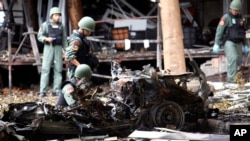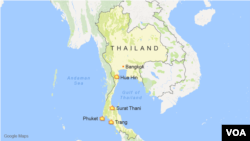A series of recent bombings in Thailand, including one this week, remain unexplained. But analysts say they cast a shadow over peace talks scheduled to begin next Friday between the Thai government and southern insurgents.
On Tuesday, a stolen ambulance truck packed with 80 kilograms of explosives detonated outside the Southern View Hotel in the seaside town of Pattani, wounding at least 30 people and killing a 35-year-old woman. A second victim died Friday from injuries suffered in the blast.
The attack came less than two weeks after a series of bombings and arsons at several south-central Thai beach resorts, including in the town of Hua Hin, just 200 kilometers south of Bangkok. Four people died and more than 30 were injured in the August 12 attacks.
No one has claimed responsibility for either the most recent or earlier attacks. But the spread of violence beyond the southern border provinces raised concerns of a tactical shift by the insurgents, primarily Muslim separatists seeking regional autonomy from the Buddhist majority state.
The Thai government has been claiming some success in reducing insurgent violence in the southern border provinces of Yala, Narathiwat, Pattani and Songkhla. Peace talks are scheduled for September 2 between officials and representatives of a southern separatist umbrella group, MARA Patani.
Possible impediment
The recent violence has created new uncertainties about whether the peace talks will lead to progress, said Pakorn Preeyakorn, an executive member of the Islamic Center of Thailand.
Pakorn said that, until the August 12 bombings, it appeared most insurgent groups wanted to negotiate. "I don’t understand the movement of this violence," he said. “As the government says, this is a new situation — not like before."
Deputy Prime Minister Prawit Wongsuwan told local media the government would not make any peace deals as long as violence persisted. Prawit also recommended establishing a special front-line cabinet to deal with the renewed violence.
Human rights lawyer Somchai Homlaor said the return to talks, suspended roughly two years ago, reverses government policy regarding the southern border insurgency.
Somchai said that until this month, the military was confident its tough security measures over the past two years had been successful.
"So they even stopped the peace process. And because of this top-down policy, they stop to engage or involve different sectors in the south to participate in the peace process, to participate in monitoring or implementing the security policy," he said.
Violence linked to insurgency
Thailand’s southern border provinces have been beset by a Muslim separatist insurgency since January 2004. The resulting violence has claimed more than 6,500 lives and injured thousands.
The insurgency seeks greater regional autonomy from the Thai state, which the central government has consistently rejected.
The Islamic Center’s Pakorn said the government must press ahead with the peace talks. It’s "the best thing the government should do," he said.
"But ... I don’t know exactly who should play a significant role in the negotiation process because we don’t really know who is [behind] the sort of violence at the moment," Pakorn said.
Brad Adams, Asia director for the New York-based Human Rights Watch, condemned the renewed violence, saying the insurgents showed "incredible depravity towards civilians," amounting to crimes against humanity.
But some rights activists say progress toward peace also has been undermined by the military’s harder-line policy in dealing with the southern insurgency.
More than 50 people in Thai military detention have been tortured, a report released earlier this year alleged. The report was co-authored by Somchai Homlaor; Pornpen Khongkachoniet, who directs the rights group Cross Cultural Foundation; and Anchana Heemmina, who leads the Duay Jai group. The military is suing all three for defamation.
But Somchai said that, to reduce violence in the southern provinces, the military must give human rights a greater priority.
“We believe that the conflict in the south cannot be solved or the peace in the south cannot be rebuilt without respect of the human rights. This is a must,” he said.
He said by addressing the charges of rights abuses, the government would be better placed to “win the hearts of the people in the south.”





